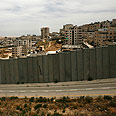
World's checkpoint hypocrisy
Op-ed: While fences exist worldwide, only Israel's life-saving barriers face harsh condemnations
Today there are some 50 barriers and fences in the world. Bill Clinton, who came to power promising “a bridge to the 21st century,” gave the US the wall with Mexico; Spain built fences to keep out Moroccans; India is walling off Kashmir and Bangladesh; South and North Korea share the most heavily fortified border in the world.
Elsewhere, Saudi Arabia has an epic wall project; the glitz, wealthy Arab sheikhdoms are closing the border with dirt-poor Oman; Russia is considering walling off Chechnya; Western Sahara has “the Wall of Shame”; Cyprus is entirely divided by walls; Belfast is a fenced city of brick, iron and steel barriers, and even the ultra-liberal Nederlands built a fence around the Hook of Holland.
But only Israel’s barriers have been condemned by the International Court of Justice, only Israel’s fences have received round-the-clock coverage on CNN and front page stories on the New York Times, only Israel’s checkpoints are turned into the meccas of “peace” activists and are condemned by Western public opinion as an instrument of harassment used to subjugate a proud “native” people, whose only crime is wanting freedom, or “liberation.”
While foreign fences keep out livestock and refugees from neighboring countries, only Israel’s fences and checkpoints have a truly humanitarian reason: to secure the civilian population's right to life. Only in Israel barbed wire, patrol roads, sand tracking paths, video cameras and electronic sensors are used to prevent a restaurant, a shopping mall or a hotel from being turned into carpets of human bodies.
Paradoxically, barriers have been anathema to Jews since 1179, when the Vatican Council established the medieval ghettos throughout Europe. Yet very soon, the Jewish State will be enclosed by steel and concrete. Israel is erecting another fence to protect its civilian population from terrorist fire. After Judea and Samaria, the Golan Heights, Gaza and the Egyptian border, it’s the turn of Metulla, the northern city hit by Hezbollah rockets and where Yasser Arafat’s killers murdered tourists and students.
Vital anti-terrorism instrument
Prime Minister Benjamin Netanyahu’s government just removed several roadblocks in the territories to ease Palestinian daily life. It’s a difficult decision, as in the past Israelis have been killed after checkpoints were removed. Since 2008, Israel removed some 30 checkpoints throughout the territories, leaving 11, mostly located along the Green Line.
None of the other fenced countries have infiltrators with the “holy” purpose of killing people. Tijuana, the symbol of the wall dividing US and Mexico, is not Qalqilya, a Palestinian city 15 kilometers from Tel Aviv, ringed by a fence and checkpoints. It’s Qalqilya, not Tijuana, that has been called the “Paradise Hotel”, because the city was used by suicide terrorists as the jumping off point into Israel. It’s from Qalqilya, not Tijuana, that terrorists can bomb Tel Aviv’s Azrieli towers, which can be seen from the city’s hills.
The checkpoints, Israel’s most common barriers, are its most vital and disruptive counterterrorism instrument. Unlike Checkpoint Charlie in Berlin, which today is a monument to oppression’s defiance, Israel’s checkpoints are a symbol of life. According to the IDF, some 30% of Israel’s counterterrorism arrests took place at the roadblocks.
Israel improved the quality of life at the checkpoints with bathrooms and shaded areas. But Palestinian terrorists then deliberately took advantage of it. In 2004 a Palestinian woman killed four Israelis at a checkpoint in Gaza by pretending to be disabled. Because of her condition, the soldiers performed their security checks without first using a metal detector. She then detonated her explosive device.
It’s true that everyone who goes through a checkpoint is treated as an enemy. It’s true that checkpoints are an insult to Palestinian daily life. But without the checkpoints, fences, roadblocks and barriers Israel would never be able to exist.
Explosive belts and bombs are regularly detected at the checkpoints, but Western media outlets usually don't report it.
Today it’s only because of these symbols of security that Israelis are no longer assailed by suicide bombings and shootings like they were during the height of the second Intifada.
We can draw the same lesson from the embassies’ metal detector, Ben Gurion Airport’s strict security procedures, the guards at the entrance to Tel Aviv's shopping malls, the so-called “apartheid wall,” and the nuclear plant in Dimona. If the Arabs disarm, there will be peace; but if Israel disarms, there will be another Holocaust.
Giulio Meotti, a journalist with Il Foglio, is the author of the book A New Shoah: The Untold Story of Israel's Victims of Terrorism










